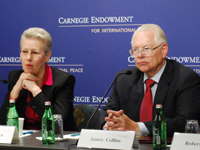Registration
You will receive an email confirming your registration.
IMGXYZ2673IMGZYXDuring a panel discussion at the launch of her new book, Lonely Power: Why Russia Has Failed to Become the West and the West is Weary of Russia, the Carnegie Moscow Center’s Lilia Shevtsova assessed Russia's path toward modernization. She was joined by Stephen Sestanovich of the Council on Foreign Relations, David J. Kramer of the German Marshall Fund of the United States, the RAND Corporation’s Andrew S. Weiss, and the Brookings Institution’s Robert Kagan. Ambassador James F. Collins of the Carnegie Endowment moderated.
Russia's Path Toward Modernization
- Preserving the Status Quo: The current Russian process of modernization is not the country’s first attempt at top-down reform. While Moscow’s leaders attempt to modernize Russia by re-energizing the country and building a high-tech economy, their real aim is to preserve the political status quo, argued Shevtsova. High popular approval ratings should not distract observers from the fact that President Dmitri Medvedev’s liberal modernization rhetoric masks a growing repressive trend in the country.
- Bound to Fail: This attempt at modernization is bound to fail, Shevtsova said, due to Russia’s lack of political and economic competition. Cracks are already beginning to appear in Russian society, evident in the emerging gap between the authorities and the people.
- Engaging the West: By focusing largely on its own needs, the West has opted to maintain the Russian status quo, enabling Russia’s hybrid, anti-Western system to survive contended Shevtsova. This cannot continue. The question facing Russia is not whether to engage with the West, but rather what form engagement should take.
Economic Modernization and Political Liberalization
- The top-down approach is an obstacle to modernization, Kramer said, citing the example of Skolkovo, which the government is backing in hopes of creating a Russian Silicon Valley but which has so far met with some skepticism both domestically and abroad. Modernization will succeed only when Russian and foreign companies are able and willing to invest in Russia, initiating a broader bottom-up process, Kramer said.
- The mantra that “economic modernization produces political liberalization” does not always hold true, Kagan argued. He predicted that Vladimir Putin will seek economic modernization without political liberalization; the Kremlin wants the former but not the latter. Shevtsova agreed, suggesting that Russia's current situation is one that features economic growth without significant underlying economic and political development.
The Future of the U.S.-Russia Reset
- New START: The U.S. Senate's failure to pass New START would create a narrative that the reset failed because of Republicans in Congress, letting Prime Minister Putin off the hook from carrying out any further reforms, Kagan argued. On a broader strategic level, therefore, opposing START would be a mistake; it is not in the interests of the United States to give him that kind of cover.
- Engagement: Weiss praised the Obama administration for its engagement with Russia on controversial issues such as Iran’s nuclear program. The West has an obligation to reach out more to Russian society and broaden dialogue on a variety of issues, he asserted.
- Human Rights: The Obama administration remains too hesitant to criticize ongoing political abuses in Russia, Kramer said, even as Russia emphasizes economic modernization over sensitive issues like human rights and democracy.
- Economic Modernization: U.S. policy toward Russia's efforts at economic modernization should distinguish between U.S. companies and the U.S. government. While the private sector is free to act as it wishes, Kramer argued that Washington should not aid Russia's economic modernization without signs of simultaneous political modernization.
- Domestic Concerns: The reset may soon be entering a new phase, Sestanovich predicted, one where questions about Russia's domestic evolution will become more prominent. Russia's own debate about modernization provides a space to insert Western views, he argued, and Russia's electoral calendar, as well as ongoing doubts about the transparency of the upcoming 2012 presidential election, will encourage domestic discussion about the nature of Russian democracy. He concluded that political activism among ordinary Russian citizens is on the rise, which will also encourage Western rhetoric about Russian democracy to become more prominent.
Looking Forward: Potential for Upheaval?
- Sestanovich discussed whether Russia must experience major social and political upheaval, essentially another revolution, before it can experience positive change. Political mobilization is increasing, he concluded, but has not reached the level of a revolution. At the moment, there is no revolutionary potential in Russia, Shevtsova agreed. While small social groups could become catalysts for change, the Kremlin retains a tight grip on political and social behavior. There is nothing to indicate any kind of revolution will happen before the next presidential election.
- Shevtsova suggested two possibilities for Russia’s short-term future. First, she argued that the status quo will persist in the near future, with growing “areas of degradation” developing in all aspects of Russia's economy and society, ranging from crumbling infrastructure to growing inequality . Alternatively, she suggested that pressure from the Russian people in large cities will create a split in the current ruling elite.
Conclusion
Collins concluded by urging the West to avoid becoming “prisoners of the past.” A large part of Russia’s population today has little to no memory of the Soviet Union and embraces Russia's involvement in the international arena. As a result, this group will create a different Russia. Previous attempts at modernization took place in a tightly sealed environment, where the government could control the process from within. This is no longer possible: Russia is part of a global system and cannot operate in isolation. The new generation knows this, and it will shape its Russia accordingly. The West must be careful about basing its predictions of Russia’s future on what has happened in the past, Collins warned.
